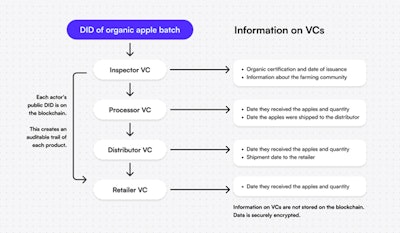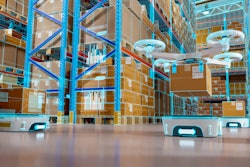
The Blockchain In Logistics market size was valued at $3.3 Billion in 2020 and is projected to reach $1620 Billion by 2028 according to Verified Market Research, growing at a CAGR of 62.4% from 2021 to 2028.
Blockchain technology has the potential to revolutionize logistics, providing a secure and efficient way of managing supply chain operations. By providing end-to-end visibility, blockchain can eliminate fraud, improve the quality and safety of products, streamline verification processes, reduce paperwork and enable better traceability.
There are many possible use cases for blockchain in logistics, including document verification, product authentication, smart contracts, asset tracking and digital identity management. With blockchain technology paving the way for improved efficiency and security in logistics operations, it is sure to bring about profound changes in the industry.
Benefits of Blockchain in Logistics
Enhanced transparency
One of the most significant advantages of blockchain in logistics is the enhanced transparency it provides, providing a clear audit trail. This is possible because blockchain enables the creation of fraud-proof digital documents called verifiable credentials that can be instantly checked for authenticity in seconds. This makes it easier for supply chain managers to track the movement of goods, from production to delivery and identify any bottlenecks or delays in the process.
Improved efficiency
Logistics operations can be much more efficient when verifiable credentials are issued within organizations’ systems. Their instant verifiable nature streamlines processes, reduces paperwork and minimizes errors. By automating tasks like document verification, blockchain can reduce the time and cost of manual processes. This can result in faster and more accurate transactions, reduced lead times and improved customer satisfaction.
For example, blockchain can be used to automate customs clearance processes, reducing the time and cost of compliance checks. It can also help track shipments in real-time, enabling logistics providers to optimize routes, reduce transit times and minimize the risk of delays or theft.
Better traceability
Traceability is a critical aspect of supply chain management, particularly in industries like food and pharmaceuticals, where safety and quality are paramount. Blockchain can eliminate document fraud, help identify the origin of any quality issues, minimize the risk of counterfeiting and ensure that products meet regulatory standards.
For example, blockchain can be used to verify the origin of organic produce and ensure that fish are sustainably sourced. Or in the event of a recall, blockchain can help identify the source of the problem and pinpoint which products are affected. By providing end-to-end traceability, blockchain can improve the quality and safety of products and build trust with consumers, regulators and stakeholders.
Enhanced security
Blockchain provides security and enables data to be fraud-proof and instantly verifiable with the use of cryptography. Cryptography is a broad term that refers to the practice of securing communication from third-party interference. It includes various techniques such as encryption and digital signatures. Cryptography ensures that the data in the document wasn’t manipulated since it was issued.
Blockchain Technology Basics
To further understand the potential and benefits of blockchain in logistics, it's important to grasp the basics of how blockchain, decentralized identifiers (DIDs), and verifiable credentials technologies work.
Blockchain
Blockchain is a decentralized digital ledger that records transactions in a secure and transparent manner. Instead of relying on a central authority to validate and authenticate transactions, blockchain uses a network of nodes to verify each transaction. Once verified, the transaction is added to the blockchain, forming a permanent and tamper-proof record.
Public decentralized identifiers (DIDs) can be stored on the blockchain. For enhanced security and privacy, verifiable credentials connected to the DIDs are securely stored on user devices and not on the blockchain.
Verifiable Credentials (VCs) dock.io
dock.io
Verifiable credentials are a new way of securely storing and sharing information about yourself, products, or your business. They are digital certificates made fraud-proof and instantly verifiable through the use of blockchain and cryptography.
In logistics, verifiable credentials can be used to improve supply chain transparency and efficiency. They offer a secure and flexible way to manage and share information in logistics, helping to streamline operations and increase trust among supply chain participants.
For example, a logistics company could issue verifiable credentials to its suppliers, which would provide proof of their compliance with certain standards or regulations. These credentials could then be shared with other parties in the supply chain, such as customers or regulators, to ensure that the products are safe and meet the necessary requirements.
Decentralized Identifiers (DIDs)
A decentralized identifier (DID) is a way to identify something or someone without relying on a central authority. A DID is like having a unique digital identification (similar to an ID number) that you control and can share with others. DIDs contain the cryptographic keys that make a document fraud-proof and instantly verifiable. They enable organizations and individuals to securely and efficiently manage, verify and protect their verifiable credentials and digital identity.
In logistics, DIDs can be used to create a trusted, secure and efficient way to manage identities, and data across the supply chain. Each party in a supply chain can have a DID like the manufacturer, distributor, logistics company and so on. Each product can also have a DID as well to help track its movements.
Use Cases for Blockchain in Logistics
Here are just a few of many potential use uses of blockchain in logistics:
- Instant document verification: Verifiable credentials enable instant document verification by allowing digital documents to be quickly and easily verified through the decentralized blockchain network. For example, the bill of lading would be issued as a verifiable credential containing all the necessary information about the shipment, such as the date of departure and contents of the shipment, all of which is securely encrypted on recipients' individual devices, not on the blockchain.
- Eliminating fraud: Blockchain, verifiable credentials and decentralized identifiers work together to provide a secure and tamper-proof system for identity and data verification. Organizations can ensure that the information they receive is accurate and trustworthy.
- Product authentication: Blockchain can be used to create a tamper-proof and immutable record of a product's journey from the manufacturer to the end consumer, allowing customers to verify the authenticity of the product and prevent the sale of counterfeit goods.
- Smart contracts: Blockchain can be used to automate certain processes in logistics, such as payments or contract enforcement, through the use of smart contracts. These contracts can be programmed to execute automatically when certain conditions are met, eliminating the need for intermediaries and reducing costs.
- Digital identity: Blockchain can be used to create a decentralized and secure digital identity system for logistics participants, allowing them to verify their identity without relying on third-party intermediaries. This can help prevent fraud and improve security.
Blockchain technology has the potential to revolutionize logistics operations by providing greater transparency, efficiency, and security. By leveraging the power of distributed ledger, decentralized identifiers (DIDs) and verifiable credentials, companies can gain visibility into their supply chains and automate certain processes. This can help reduce costs, improve customer satisfaction, ensure regulatory compliance and enhance security in logistics operations.




















